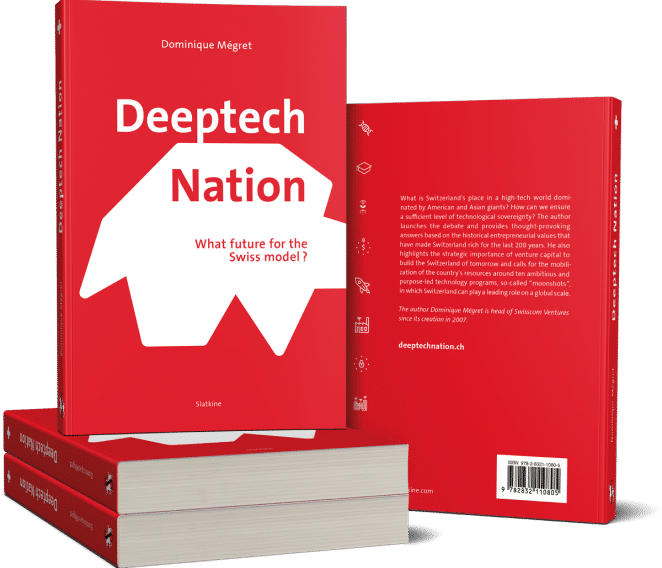As the Deep Tech Nation Switzerland Foundation, we are therefore dedicated to supporting start-ups and scale-ups with exceptional potential for growth in the Deep Tech Nation Switzerland industry. We are committed to bringing innovations to market, creating jobs for highly qualified professionals and generating added value that benefits not only Switzerland but also society as a whole in the long run.
About us
Deep Tech Nation Switzerland offers pivotal solutions for overcoming our society’s challenges. This is why we at the Deep Tech Nation Switzerland Foundation are dedicated to bringing about lasting changes to the Swiss innovation ecosystem in order to maintain Switzerland’s competitive edge in the decades to come.
The Deep Tech Nation Switzerland Foundation is an independent non-profit foundation that emerged from a private initiative of the founding members Swisscom, UBS and Stadler.
Focused Deep Tech Nation Switzerland industries
Life Science
Industry 4.0
Space Tech
Food Tech
Ed Tech
Bio Tech
Agri Tech
Fin Tech 2.0
Trust Economy
Clean Tech
Health Tech
Smart Cities
Start-ups and scale-ups in the Deep Tech sector develop and market technological innovations that address significant societal issues by putting new scientific findings to work.
They therefore differ from start-ups and scale-ups that rely on existing technologies for their business models and whose successes are more likely to be attributable to disruptive marketing or operational business strategies.
Our goal
Switzerland aims to become one of the world’s leading Deep Tech nations by 2030. To achieve this, we are committed to mobilizing CHF 50 billion in venture capital, which will pave the way for Swiss Deep Tech start-ups and scale-ups to create 100,000 jobs
Global leader
CHF 50 billion
100,000 jobs
These conditions are perfect for creating a flywheel effect that involves the entire innovation ecosystem with all relevant stakeholders, including education, start-ups, scale-ups, investors, companies and policymakers, thus setting a national movement in motion.
The aim is always to create value in Switzerland as a leading innovation nation and to ensure Switzerland’s competitiveness both now and in the future.
Our actions
Switzerland leads the world in innovation. However, its innovative capabilities are not backed by the required financial resources: While Switzerland allocates more than CHF 20 billion per year to education and research, only around CHF 3 billion is invested each year in venture capital for the commercialization of innovations, specifically in start-ups and scale-ups. Leading countries at the forefront of innovation that are comparable to Switzerland invest CHF 10 billion.*
As a result, Switzerland is slowly losing ground to the global competition and its prominent position as an innovation leader.
We need to take action. Now. We are therefore committed to making changes to the relevant framework conditions of the Swiss innovation ecosystem by 2030 through the implementation of the following actions.
*Source: 2021, Startupticker.ch, SEFRI Research & Innovation Report
Venture Hub Switzerland
Our efforts are focused on creating a consolidated hub for venture capital. This hub provides internationally competitive financial and legal frameworks to attract foreign investors to Switzerland and create optimal conditions for institutional investors (such as pension funds) and strategic investors.
Unicorn Factory
Swiss Deep Tech companies should be at the forefront. To make this a reality, we need at least 20 percent more start-up and scale-up companies with significant potential to take a leading international role as technology leaders. We are expanding the number of such dynamic enterprises in a targeted manner with a unicorn factory that leverages existing structures and processes
Information platform
We are creating a comprehensive information platform that consolidates the Swiss innovation ecosystem into a centralized and easily accessible resource. All pertinent information is conveniently located in one place, making it easier to access for everyone.
International Promotion
In order to attract the necessary attention for our activities, we rely on targeted international promotion. Switzerland should become as internationally renowned as a Deep Tech nation as it is for the Matterhorn, chocolate and the Swiss Army Knife.

The Deep Tech Nation Switzerland book
To remain competitive in the international arena, Switzerland needs to ensure a high degree of technological independence. Dominique Mégret, author of the book “Deep Tech Nation” and a seasoned venture capital expert, set this debate in motion with worrying statements – based on the historical entrepreneurial values that made Switzerland rich over the last 100 years. He emphasizes the strategic importance of venture capital for building the Switzerland of tomorrow and calls for the mobilization of the country’s resources as well as targeted technology initiatives.